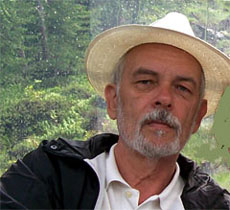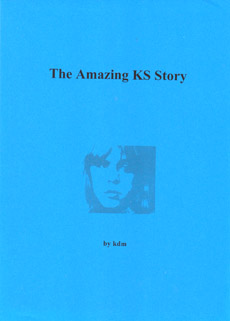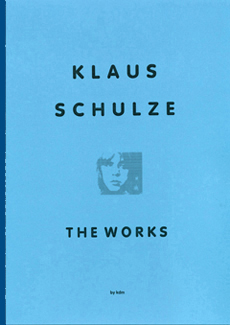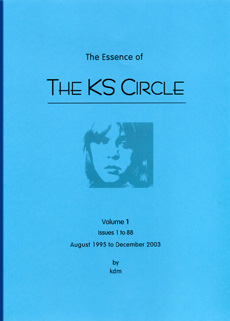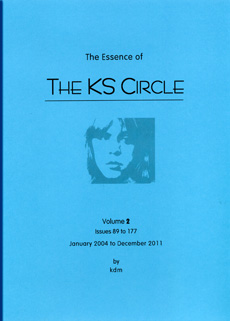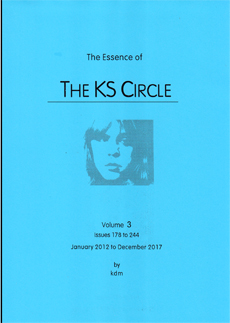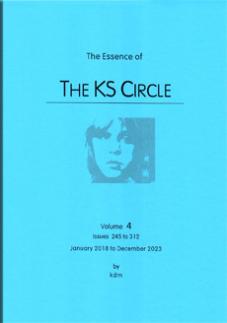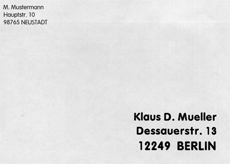Montag, 31. März 2014
Gerade lief im 'Kulturradio' der Song "I Believe to My Soul", gesungen von irgendeiner Lusche namens Donny Hathaway, der natürlich vom Ansager als gaaaanz toller Hecht angepriesen wird. Himmelhilf, so wenig Soul und so 'ne belanglose Stimme...
...hört man leider viel zu viel alltäglich im Radio.
Gleich mal das Original von Ray Charles aufgelegt, der mir 15jährigem Teenager vor über einem halben Jahrhundert beibrachte, was "Soul" ist.
... link (4 Kommentare) ... comment
Sonntag, 30. März 2014
Wer ein wirklich amüsantes, mitreißendes Buch im kommenden Urlaub lesen möchte, möge antiquarisch danach suchen (ich fand’s und bekam’s für 0,01 plus 3 Euro Porto); ich verspreche vier Stunden bestes Lesevergnügen (und zwar in einem Rutsch, so wie ich, der’s letzte Nacht einfach nicht aus der Hand legen konnte):
“Das Werden des jungen Leiters” von Klaus-Peter Wolf (1986, Büchergilde G., 270 Seiten).
Ich kam drauf, als ich wieder mal in in meinen Regalen kramte, hier und da blätterte und einiges wiederlas ...und in einem 27 Jahre alten “Der Rabe” (Nr. 17) diesen kleinen Lesetipp (Der Rabe rät: "...haarsträubend", "...kein noch so dreistes Klischee, keinen noch so abstrusen Handlungsstrang ausläßt") entdeckte. Das war nicht verkehrt. Jetzt steht's im Regal zwischen "Herr Lehmann" und (dem frühen) Tom Sharpe.
... link
Sonntag, 23. März 2014
"Er habe noch keinen wirklich großen Dirigenten gesehen, der bei atonaler Musik eine Erektion gehabt hätte, erzählte mir einmal ein zweiter Geiger." . . . . . . . . . . . . . . . . (...notierte einst sehr trefflich der Telemax)
... link
Donnerstag, 20. März 2014
Heute geht's in Grüne, weil die Sonne scheint, weil es 20 Grad und mehr werden ...und weil Julia Geburtstag hat. Ziel des Ausflugs: der Karl-Foerster-Garten im Norden von Potsdam.
... link (1 Kommentar) ... comment
Freitag, 14. März 2014
Die Medien berichten heute alle(?) ausführlich über den Abschied von Harald Schmidt in seiner allerletzten Sendung im Sender "Sky" und verweisen auf den Mitschnitt bei YouTube. Dort hab ich's mir tatsächlich mal angesehen.
Ist keinem diese Sendung hinterher beschreibenden Journalisten aufgefallen, dass der persönliche Brief vom Intendanten und Geschäftsführer des "Berliner Ensemble" und früheren Direktor des Burgtheaters in Wien (darauf legt Peymann großen Wert in seinem Brief), den Harald Schmidt lesbar in die Kamera hält, einen deutlichen Schreibfehler enthält?
... link (2 Kommentare) ... comment
Hab' mal wieder mein überquellendes CD-Regal durchgesehen, einiges davon rausgezogen und erneut reingehört. Mit ernüchterndem Ergebnis. Diese vor nicht langer Zeit - von wem? - hochgepriesenen CDs hab ich anschließend entsorgt. Tja, so schnell geht's manchmal mit der Popmusik:
Jonathan Wilson, Tu Fawning, Caravan Palace, Mary Chapin Carpenter. (Behalten hab ich die "Black Crows", allein schon wegen des zweiten Teils in "Been a Long Time" auf "Before the Frost").
Wird von mir sicherlich mal fortgesetzt.
... link
Dienstag, 18. Februar 2014
The January/February 2014 edition with a KS interview:
"... I like to work when it's cold and only at night. I am like vampires"
... link
Montag, 17. Februar 2014
Eine seltsame Verarmung der Musikkultur scheint mir, wenn die Musik (im doppelten Wortsinn:) billiger ist als das Porto, um sie zu bekommen.
. . . Bei einem Versender gibt's zum Beispiel das Lebenswerk des in den 30er und 40er Jahren berühmten Orchesterleiters ARTIE SHAW ("Begin the Beguine") auf einer (mp3-) CD für 2,99 Euros (ja: unter drei Euros für 193 Titel). Das Porto dafür ist teurer: 3,90.
. . . Und es gibt ähnliche Angebote: 167 Titel von Teddy Wilson (DER Musiker bei Billie Holidays klassischen Aufnahmen!), ...von Erroll Garner, ... knapp 200 Titel aus der Boogie Woogie-Zeit (richtig gute, klassische Aufnahmen), etc. Und alles jeweils für 2,99! Falls jemand einwendet ach, es ist ja "nur" mp3: angeboten werden auch 10 (zehn) "richtige" CD-Alben von Artie Shaw, für gerade mal 15,99 (für alle zehn zusammen).
. . . "Verarmung" sag' ich bewusst, weil ich weiß, was passiert: Man kauft sich das, weil's SO BILLIG ist, stellt es sich ins Regal und damit hat sich's dann. Man könnte es ja jederzeit hören. Macht man aber nicht. . . . Langsam versteh' ich die Vinyl-Freaks.
.
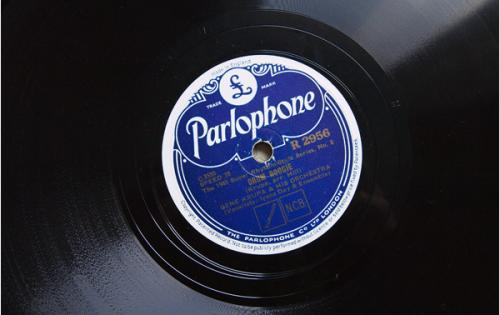
.
Und die Schelllack-Platten-Sammler mochte ich sowieso schon immer.
... link (7 Kommentare) ... comment
Freitag, 14. Februar 2014
2008, Schiller Theater Berlin, after concert, made by Julia
.
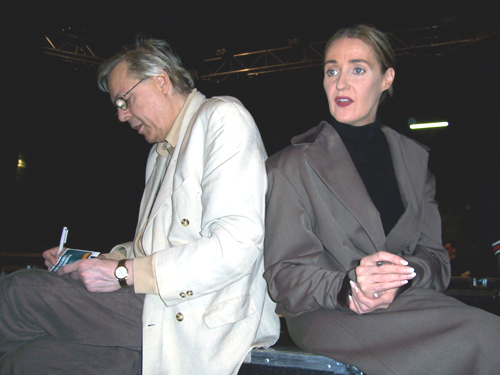 .
.KS: Call me a cab. ... Lisa: Hu? ... KS: Call me a cab. ... Lisa: You're a cab.
... link
Donnerstag, 13. Februar 2014
Und schon wieder: Am 13. Februar gibt's im Supermarkt "Reichelt's" die ersten bunten Ostereier. Diesmal sind's 66 Tage bis Ostersonntag.
... link
Dienstag, 11. Februar 2014
kdm: If you look at today's music scene, nearly everyone is doing home-recording, and mostly it's "electronic". In the daily press I read that many studios have to close down, even some very famous ones in the USA (!) ... and of course even more the smaller studios ...all have to stop business and close.
. . . . "Techno" or "electro" is today THE big thing, regardless if in fact the music is simply by a pop singer like Madonna, or really some interesting electronic music made at a home studio. This was ABSOLUTELY NOT the case in the early seventies.
For example: In 1972 when KS startet with IRRLICHT, Edgar Froese was still very much an electric guitar player a la Hendrix (Edgar's idol then). KS told me the story when they (T.D.) had a gig as supporting group in a concert of a new star: Jimi Hendrix, here in Berlin. You can imagine how Eddie felt: He, with his Hendrix-like guitar playing (but not with the same "coolness") has to play before the original, his ideal!
Back to KS' "invention" of home-recording: In these years, long ago, no cheap mixers were available, synthesizers were out-of-reach for young musicians here in Germany (and elsewhere) who just came from school and wanted to make music. Parents of course hated that music idea and didn't support. As always. Multitrack recording was even more difficult and you HAD to go to (and to pay) a professional studio for that. "Ash Ra Tempel" once did it, before their first album: It was a disaster, Manuel has told me with a smile. The studio people and the secretaries HATED it: "Too loud" of course (as always!), too wild, too long, too unorganized...
Most of these youngsters with the wish for music, at this time, wanted to made rock of the day, which means: either bluesrock, Beatles, Stones, etc. or they tried to play like Grateful Dead, etc. But in all cases it was just copies, often lousy copies. Not many of these youngsters sat down and started on their own, with simple equipment, to play, create, and "invent" something of their own. Normally they had the rock albums at home, from their idols, and wanted to play like them. As every generation :-)
Schulze and his "Irrlicht" was very different. This was not the usual pop or rock of the day. But it was released and marketed as a "pop" record (and not like Stockhausen or Subotnick or Ussachevsky or Ligeti, etc.).
And the reactions from the pop/rock front to Irrlicht and Cyborg were: "he's an idiot", "what is this for a shit?", "not listenable", etc. ... What else?
The collegues from Amon Duul, Can, and all the many others still played with drums, bass, electric guitar, (sometimes organ), and a singer, trying to follow the English-American trends. Sometimes they found their own sound as for instance, CAN, (...because they simply could not play as good as their idols from the USA or from England?)
One example: (Not just) T.D. was very much into Pink Floyd during the late sixties. Of course they wanted to do "the same" as Pink Floyd did. But what came out? Something else. And it was successful, at least after 1973 and with the help of a good working label. I cannot prove it, but I guess that this happens often in music history: A young man tries to copy something that he likes very much, but he is not good enough; instead he "finds" a new music, ...if he's lucky and gives not up! :-)
Of course young KS spoke (then) proudly of "The Klaus Schulze Studio" which in fact consisted just of a cheap tape recorder (in the beginning not even a "Revox" but a little common "Telefunken" with quarter-tracks and a cheap microphone which he even used to record a string orchestra for IRRLICHT and CYBORG), in addition he had the usual little tape-echo machine, same as electric guitar players had at this time, and an old & broken electric organ :-) And many ideas.
Just one example: when KS was at the local radio to promote his first and still new album IRRLICHT, the radio people said (not being aware that KS could hear them): "He's nuts." Much later, KS told this story in various interviews, and now he could smile about this early episode. When you listen to IRRLICHT, and remember the normal music in 1972, you maybe understand these radio people:
. . . IRRLICHT is most certainly not the usual pop or rock album which you expect from a long-haired hippie and rock drummer around 1972. Of course not. Just look what was popular in 1972 in the USA (und therefore, also in Germany): Gilbert O'Sullivan, Don McLean's "American Pie", Roberta Flack, Bill Withers with "Lean On Me", "Chicago V", Concert for Bangla Desh, Neil Young's "Harvest", etc. Best new artist of the year was a group with the name "America" (= "A Horse With No Name"). Of course, the American and British music successes were always taken over to Germany and continental Europe.
The wider audience did not notice. A few minutes of this "strange" new music was then just rarely heard on a special radio program, once in a week or a month, and one or two music magazines noticed it after release, and that's it. This happens all the time and again and again. Normally, when there is no sudden success, the artist changes his style, or he gives up playing and recording music, or he becomes A&R manager in the record industry, or a studio manager, or whatever.
Back to Klaus Schulze. Pop & Rock is meanwhile a HUGE business. But the wider public still does not notice a music like Klaus'. He's never on tv (on Germany just once in 35 years), and rarely played on the radio (only in very special programs. Hello, Olaf!). For the press KS is simply no "sensation" anymore, he's no new young turk they can put their flowery stories around. (I don't know, my friend, how much you know about how the press generally works).
(from THE KS CIRCLE no. 126)
... link (2 Kommentare) ... comment


